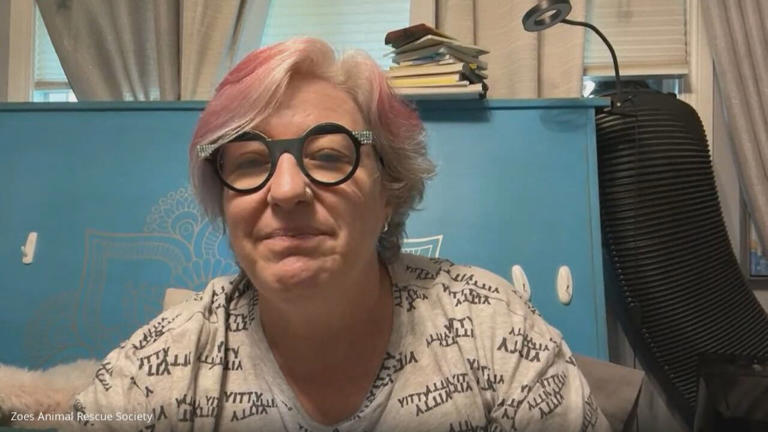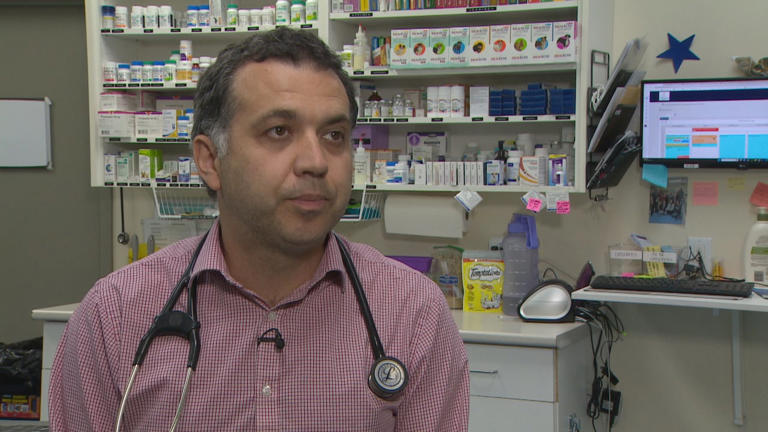Alberta seeing 'crisis' in veterinarian staff shortages, emergency animal care
Story by Madeline Smith •
Pet owners and veterinarians are sounding the alarm about a shortage of veterinary professionals in Alberta, and they say more action is needed for short-term relief.
One vet clinic that previously offered after-hours emergency services shifted last week to a referral-only practice, and animals that need urgent care after business hours have to be sent to one of the two other Edmonton and area clinics that are open at night.
Zoe's Animal Rescue co-director Kath Oltsher recently brought a critically sick kitten to an emergency vet, only to find them so full overwhelmed they couldn't even get in to wait — they had to rush her across town to the other after-hours vet instead.
"There is an unbelievable shortage and it's happened since the pandemic," Oltsher told CBC News.
"We have so many dogs now and so many cats now, I think we're well over what our system can handle."

Kath Oltsher, the co-director of Edmonton-based Zoe's Animal Rescue, says the shortfall in emergency veterinarian services is a "crisis." (Ayesha Haq/CBC)© Provided by cbc.ca
According to Alberta Veterinary Medical Association president Natasha Kutryk, Alberta has a higher pet ownership rate than the Canadian average, sitting above 60 per cent.
And while the vet shortage is a problem globally, Albertans trying to get care for their animals are facing daily frustrations, with vets left scrambling to help.
The same problems affecting access to emergency care are showing up in general veterinary practice too.
Glenora Family Pet Clinic veterinarian Nick Barbaza said he sees staffing problems as the "top issue" in vets' minds, as they struggle to find qualified vets and veterinary technicians to meet demand at their practice.
Barbaza's clinic doesn't offer after-hours emergency services, but he said he often hears about animals waiting eight or 10 hours to be seen at emergency centres.
"When they cannot get that care, it can be very tough," he said.
"As a result, the pets are going to suffer, or prices are going to increase — and mental health, we're struggling. People are angry, and we're trying to help everybody, but it's only so much we can do."
'The crisis is real'
The province's only veterinary medicine program at the University of Calgary received additional funding in the 2022 provincial budget to bolster enrolment to 100 students by 2025..
But University of Calgary faculty of veterinary medicine dean Renate Weller said even as more vets are trained, it will take time for them to cycle into the province's workforce.
"We're putting more vets on the market. It will take us until 2029 to feel the effects of that. So we need to do something in between, really."
Weller said workforce retention is one problem, and the U of C is revising its curriculum to better prepare future veterinarians for the stresses that come with the profession.
But she added that the university also has a role to play in helping recruit and onboard veterinarians trained in other countries, making sure they can get the credentials they need to practice in Alberta.
Barbaza said that's a critical piece of the puzzle.

Veterinarian Nick Barbaza says it's difficult to find enough qualified vets and vet technicians to meet the demand for care. (Nathan Gross/CBC)© Provided by cbc.ca
"Part of the solution is to bring more foreign-trained veterinarians that are already out there but they have a hard time coming in," he said.
"We don't see the support that we need here."
At Zoe's Animal Rescue, Oltsher said people trying to get help paying to get their pets spayed or neutered are facing waits for vet care too, potentially exacerbating the current issue even more.
"We are now looking at booking up to a month out in order for us to help people prevent their animals from having more babies. ... We're not able to handle the amount we have now," Oltsher said.
"The crisis is real. So real."
No comments:
Post a Comment